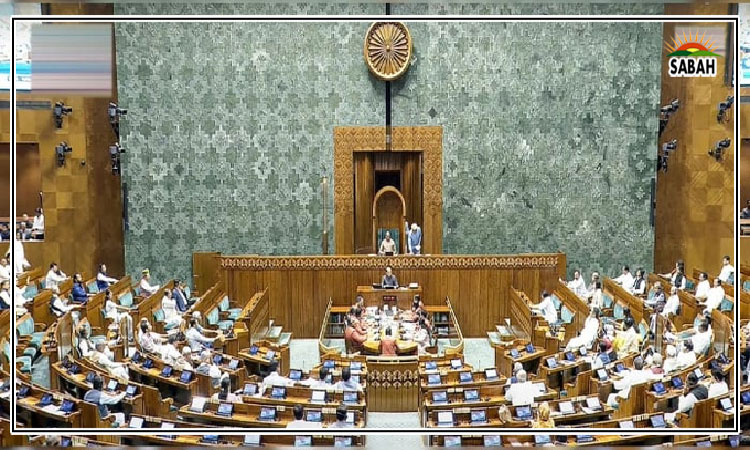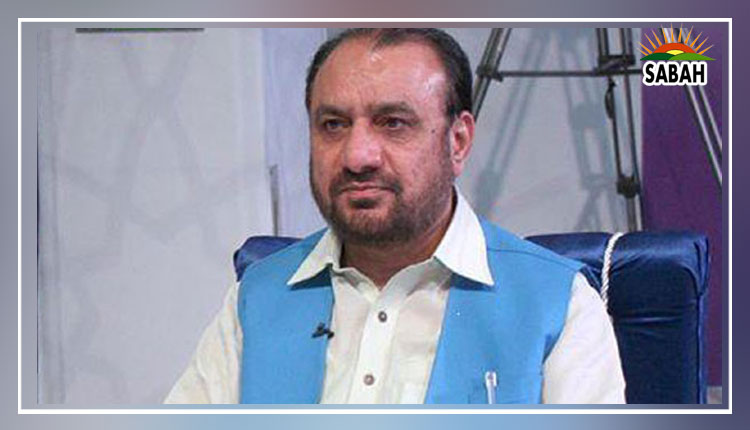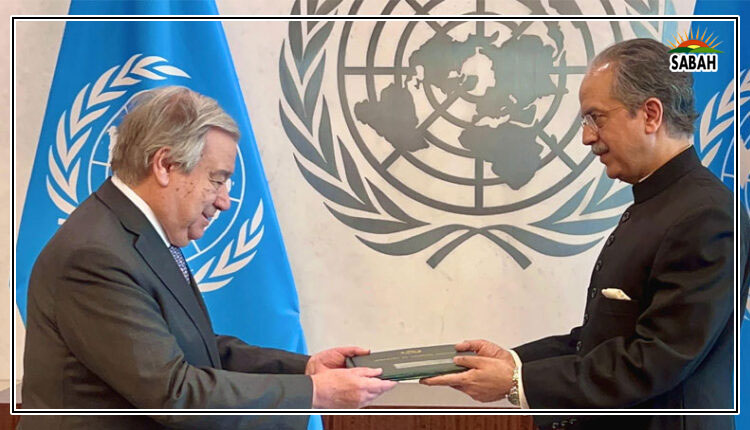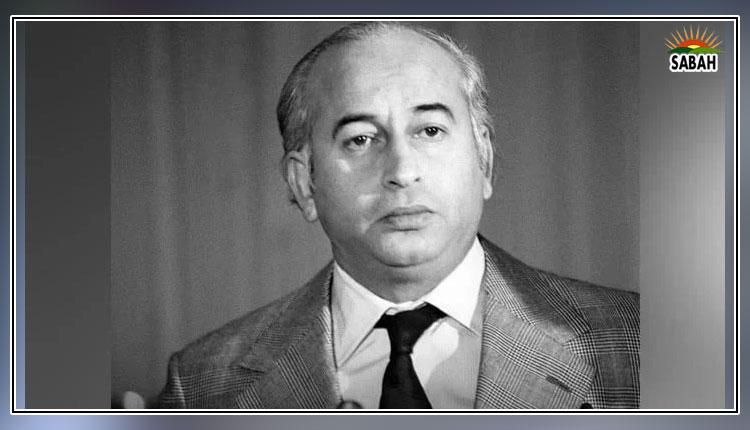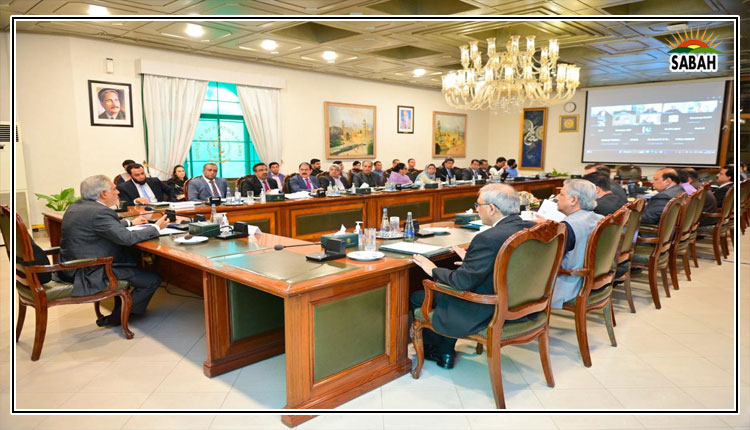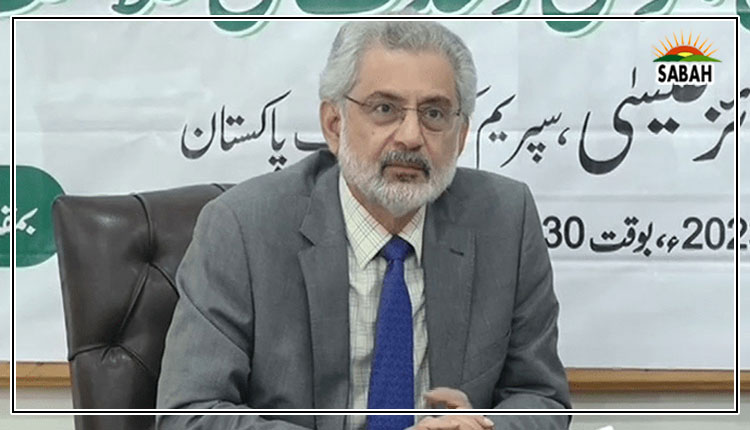Constitution gave the top court as a whole the right to take suo motu notice: Justice Qazi Faez Isa
ISLAMABAD, April 19 (SABAH): Justice Qazi Faez Isa, senior puisne judge of the Supreme Court of Pakistan, said on Wednesday that the Constitution gave the top court as a whole the right to take suo motu notice, adding that this power did not exclusively lie with the chief justice of Pakistan (CJP).
He made the remarks while speaking during an event celebrating the Constitution’s golden jubilee. During the event, Justice Isa — who is slated to become the next CJP in September — was asked about the difference in opinion regarding the top judge’s suo motu powers.
It should be noted that on March 29 Justice Isa and Justice Aminuddin Khan had ruled that the CJP did not have the power to make special benches or decide its members and that all hearings based on suo motu notices and cases of constitutional significance should be postponed until they were legislated upon. However, the order was eventually recalled by a six-member larger bench earlier this month.
“The meaning of the SC in Article 184(3) is that all judges and the chief justice unanimously [take suo motu notice],” Justice Isa said. “My opinion is that […] when the court sits, you call it the SC and Article 184(3) starts with ‘Supreme Court’. It does not mention senior puisne judge or chief justice. So my opinion is that only the SC has this right.”
Article 184(3) of the Constitution sets out the SC’s original jurisdiction, and enables it to assume jurisdiction in matters involving a question of “public importance” with reference to the “enforcement of any of the fundamental rights” of Pakistan’s citizens.
Justice Isa’s remarks come amid a growing debate in recent weeks about the CJP’s suo motu powers. A bill aimed at depriving the office of the CJP of powers to take suo motu notice in an individual capacity has also been passed by the Parliament.
However, the implementation of the bill, which is yet to become law, has been curbed by a larger bench headed by CJP Umar Ata Bandial.
During Wednesday’s event, Justice Isa said that some of his colleagues were of the opinion that only the CJP could exercise the right to take suo motu notice. “The Constitution does not say this. If it does, you may tell me the article.”
Talking about another “opinion” regarding the CJP being the “master of the roster”, he again stated that there was no mention of it in the Constitution. The senior judge said that the word suo motu was a Latin term that was not even mentioned in the Constitution.
He said there were “certain requirements” — such as if the matter was of public importance or if enforcement of fundamental rights was required — for which a suo motu notice could be taken under Article 184(3).
He said that as per his understanding, Article 184(3) was meant for those treated unjustly, such as “brick kiln workers, bonded labourers, women who were being deprived of education, forced child labour” as such citizens did not have access to legal representation.
He termed the article to be meant for the protection of such people, noting that it had been used “abundantly” in Pakistan.
Expanding upon the circumstances when Article 184(3) should be invoked, Justice Isa said it could not be used to benefit a specific person and should instead be used in matters which affected society as a whole and which concerned fundamental rights. “Where these two things are not applicable simultaneously, this article cannot be used,” he added.
The senior apex judge also said that this was the only kind of case where there was no right to appeal the court verdict. “When this article is brought into use, one should be very vigilant in each step they take.”
On the matter of him having differing views from some of the apex court justices, Justice Isa termed “ego” to be something a judge should not possess and said that having differences did not mean having a huge ego.
“When you are in [an important] role, you should not have any ego. If you are a professor, it is possible that your student might know more than you. If you possess an ego, you would frown upon him. This is wrong,” Justice Isa said.
“The day my ego would reflect [in matters], I would not remain a judge. So there are differences — only differences. […] Differences and ego have no relation,” he added.
Recalling events from Pakistan’s political history comprising of dictatorships and constitutional amendments, Justice Isa also brought up Article 58(2b).
“For his protection, he (General Ziaul Haq) inserted another constitutional article that came to be known as Article 58(2b), so that when he wishes, he can dismiss an elected government,” he said.
Terming Article 58(2b) to be “another seed of hatred and bitterness”, the senior judge said that “Gen Zia made use of the power himself and then the next president, Ghulam Ishaq Khan, also used Article 58(2b)”.
“In fact, used it twice — once to dismiss Benazir Bhutto’s government and the second time to dismiss Nawaz Sharif’s government,” he added.
Justice Isa remarked, “It also brings some shame to me that the Supreme Court kept on supporting these steps. It was challenged that the resolution is wrong but they (the SC) said ‘Let’s move on’.”
The senior apex judge also criticised late military dictator Gen Parvez Musharraf, saying, “On Oct 12, 1999, another government official thought that there is no one better than me so he [invoked] Proclamation of Emergency […] and took over”.
Justice Isa also mentioned Article 270AAA introduced by General Musharraf through which “he gave himself protection”.
He said the Constitution was not just for the judges but for the people of Pakistan, and urged the legal fraternity to learn from the lessons of the past.
Referring to the secession of East Pakistan, the justice said that the country did not split all of a sudden as the seeds of [bifurcation] were sown”. He said that the main reason for the division of Pakistan was a wrong judicial decision.
“The Constitution has not presented the way it deserves to be,” Justice Isa said, adding that whatever has been made of the Constitution should be understood. He said “Many senior lawyers don’t love the Constitution as they only care about the money”.
He said that the idea of establishing Pakistan was to have a country free from the exploitation of Muslims where they could live as they wished. He said that the biggest Muslim state in the world came into existence but the job was left half done. Justice Isa said that the “legislative assembly worked for seven years”.
“When the Constitution reached the brink of completion, Ghulam Muhammad, a civil servant, stumbled on the Constitution,” he said.
Justice Isa regretted that there had been no elections in the legislative assembly of 1956 which ended within two years.
“A civil servant concluded that he was a wise man’ and there came the martial law of 1958,” the justice said, adding that this “wise man” formed the 1962 Constitution on his own and ended the democracy.
“According to the civil servant, the people are not conscious have no intelligence, so there should be a filter. This wise man introduced basic democracy for the filter,” Justice Isa said.
Under this basic democracy, 80,000 elected representatives should choose the president and control the people with him, he added. The senior puisne judge said that Justice Munir planted the seed of the separation of Pakistan.
“This poisonous seed grew and in December 1971 the country was divided into two parts,” Justice Isa said. He said that the effects of actions taken today would manifest years and centuries later. “They issue different kinds of orders, I don’t know who they are fooling,” Justice Isa said.
Referring to the constitutional amendment of Article 58(2B), the justice said that it had been introduced to dissolve the elected parliament whenever they want. Under the 18th Amendment, 58(2B) was abolished and gave rights to the provinces, said the judge. He said that the 18th Amendment removed all the errors that had marred the Constitution of 73.
“The 18th Amendment strengthened the federation and gave powers to the provinces,” he said, adding that 17 ministries had been abolished under the amendment.
Speaking about the 50th anniversary of the Constitution, Justice Isa said that it (the Constitution) was for the people of Pakistan who have their rights in it. “This document is of every single citizen,” added the SC judge.
He said that Pakistan needed a Constitution after becoming an independent state. “Pakistan separated mainly because of a wrong judicial decision,” he highlighted.
Justice Isa said that a decision would still be wrong even if it was decided by a majority. “There are differences of opinion in a society and if everyone starts to support one thing then it would become a dictatorship.”
The senior puisne judge said that the worst thing was arrogance followed by ego and one should not have an ego if they were sitting in some position [of power].
“The day I become egoistic, I will not be a judge,” said Justice Isa, adding that dissent had nothing to do with ego.
Justice Isa said, “We have a responsibility to uphold the Constitution as it is a gift and can never be found again”.
“Those who do not follow the Constitution do not need to live in Pakistan and the Constitution also applies to foreigners residing in Pakistan,” he added.
Justice Isa said that what we do today, its consequences continue for centuries. Zulfikar Ali Bhutto was sentenced to death by one vote.
“If you don’t want history to repeat itself, then learn from the history. History has repeated itself many times to teach us – 1958, 1977, 1993 and 1999. History has taught us lessons seven times,” he continued. The senior judge termed the Constitution a gift.
Criticising dictators, Justice Isa said every dictator realised after some time that he was a democratic person. “The dictator [a possible reference to Gen Ziaul Haq] conducts a referendum and the results is 98.4%.”
Unlike the referendum, the results of the general election in Pakistan never exceeded 60 per cent, he maintained. He said that despite the differences, the government and the PNA sat at the negotiation table and resolved the issues. But on July 4, 1977, one person seized power. On Oct 12, 1999, another government employee took over power. Musharraf’s second strike was on Nov 3, 2007 when he imposed emergency.
The justice called himself an optimist. He said the judges were burdened by the Constitution “as we have taken an oath to defend and protect it”. “Unless people understand the constitution, it will have no value.”
He said every tyrant says my will, but the constitution says it’s will of the people. In a dynamic society, there are differences of opinion. If everyone starts nodding in support, then it will become a monarchy and a dictatorship.


